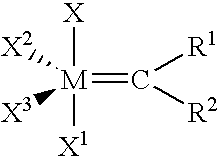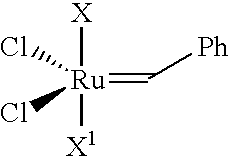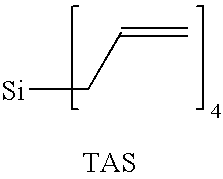Method of curing composition by metathesis reaction using reaction control agent
a technology of reaction control agent and composition, applied in the field of curing compositions, can solve the problems of relatively high dielectric constant, shortcomings of hydrosilation mechanism of rtv and lsr formulations, etc., and achieve the effect of slowing down the progress of the metathesis reaction
- Summary
- Abstract
- Description
- Claims
- Application Information
AI Technical Summary
Benefits of technology
Problems solved by technology
Method used
Image
Examples
example
[0058]Resins 1 and 2 were formulated to provide similar properties to that of the commercial RTV silicon marketed by GE, referred to as RTV6428. While RTV6428 is mixed with a 1:1 base / catalyst ratio, Resins 1 and 2 were mixed with a 10:1 ratio. A telechelic polydimethylsiloxane (PDMS) end-capped with norbornenylethyl groups was used in the base paste, with n=243 as shown below:
[0059]
The base paste formulation is provided below in Table 1:
[0060]
TABLE 1Base Paste Composition (wt. %)PDMS resin end-capped with71norbornenylethyl groupsHexamethyldisilazane treated9Crystalline silicaSub-micron hydrophobic Silica20Total100
The catalyst used in the catalyst paste is PCy3 substituted ruthenium carbene complex (2) for Resin 1 and the PBu3 substituted ruthenium carbene complex (5) for Resin 2, each obtained from Materia, Inc., Pasadena, Calif. The catalyst component was formulated by dissolving it in a partially phenyl substituted polymethylsiloxane, in particular, Dow Corning Fluid 556. The cat...
PUM
| Property | Measurement | Unit |
|---|---|---|
| temperature | aaaaa | aaaaa |
| temperature | aaaaa | aaaaa |
| temperature | aaaaa | aaaaa |
Abstract
Description
Claims
Application Information
 Login to View More
Login to View More - R&D
- Intellectual Property
- Life Sciences
- Materials
- Tech Scout
- Unparalleled Data Quality
- Higher Quality Content
- 60% Fewer Hallucinations
Browse by: Latest US Patents, China's latest patents, Technical Efficacy Thesaurus, Application Domain, Technology Topic, Popular Technical Reports.
© 2025 PatSnap. All rights reserved.Legal|Privacy policy|Modern Slavery Act Transparency Statement|Sitemap|About US| Contact US: help@patsnap.com



